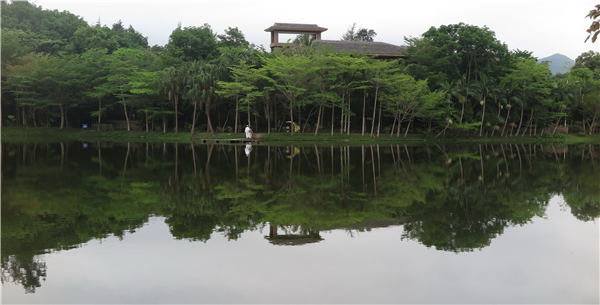Green dream dawns for a rainforest lost and regained
By Ma Zhiping in Xinglong, Hainan | China Daily | Updated: 2018-06-18 10:15

More than 20 tropical plant experts were invited to be a think tank and a detailed long-term plan was drawn up. About 1,000 local workers were hired to help improve the soil and cultivate the seedlings of rare and endangered plants, some of which Zheng collected himself from overseas.
In his heart there is a list of rare plants that he is searching for. Whenever he learns about a certain rainforest plant, he will go see for himself without caring about the cost.
He was once rushed to hospital by friends after he fell from a cliff when searching for a cycad. The lucky thing was that he found the rare plant and has reproduced quite a number of them in his garden.
"We have tried hard to breed white Gironniera subaequalis, once a top-tier plant in Hainan's tropical rainforest, but so far little progress has been made. Maybe its associated species are no longer existing," said Zheng.
But a number of endangered plants are doing well having received good protection.
Stage two begins
Now Zheng has started the second stage of his rainforest rehabilitation growing epiphyte plants, such as mosses and orchids, a special yet indispensible part of tropical rainforests that boasts of 30,000 varieties around the world.
They grow on tree trunks and survive by absorbing rain, vapor and rotten materials on the trees.
"We have grown large areas of epiphyte plants, including various orchids, on the trees and rocks. Dendrobium is a beautiful epiphyte plant that flowers and also a precious plant for traditional Chinese medicine, that we are widely planting on trees in the garden. We are making the best use of every inch of the land by creating spatial gardens on the trees.
They help build a richer ecological structure and create some added economic benefits for the garden as well," said Zheng.
To protect their growth, he has temporarily closed the garden, which has become a popular four-star tourists site.
"I will reopen the garden to let people enjoy it at a proper time," said Zheng, sitting in his garden coffee bar, which is charmingly decorated with more than 200 kinds of blossoming orchids.
Some realty developers covet Zheng's garden and ask for a piece of land for housing projects inside. He refuses pointblank, although that would bring him a huge sum of money.
"I'm considering how to share with the local people the scientific research achievements my team has made in farm produce processing and developing new varieties of economic corps such as coffee, pineapple and lichi and tuberous crops," said Zheng.
Being an epicure himself, he has developed a number of delicious foods from local crops that people rarely ate before.
Every inch of earth in the garden gets good care from Zheng, said Xiao Wang, a worker at the garden.
For example, he said, one day Zheng stopped a visitor who was digging for earthworms to use as bait for fishing. Another day, he declined a visitor who tried to pick fruits from a waxapple tree, saying, "They are not for you, they are grown for the birds in the garden."
Zheng said his progress was still in its initial stages as "it takes at least 400 years to produce a sound system of tropical rainforest."
"It is now too early to judge what I have done. Compared with what I have spent, the garden is a much greater reward," said Zheng.
























